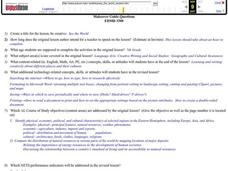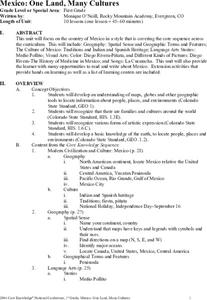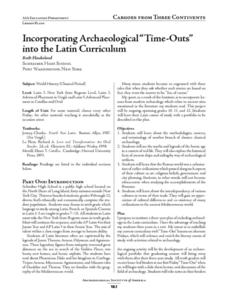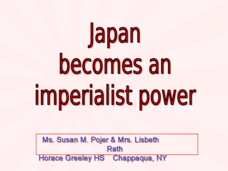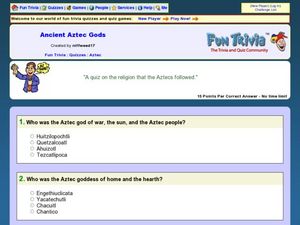Curated OER
Confucianism
Students examine the beliefs and history of the religion by studying mythology and sayings. They compare the beliefs of Confucian culture to American culture and share their information as class by an informal teacher lead discussion.
Curated OER
NYC Muslim Community Center: Why there? Why not?
High schoolers examine religious diversity issues. In this current events lesson, students read the provided articles "Sacred Ground or Bridging a Cultural Divide?" "Multiple Views of the Proposed Muslim Center," and "Protests, a...
Curated OER
Stand Up For Her Rights
Students consider how different cultural and religious groups perceive girls' education. By addressing differences and identifying common ground, students attempt to arrive at a philosophy of girls' education that takes varying...
Curated OER
Byzantium
Students examine the history of today's Istanbul. In this historical perspectives lesson, students research how Byzantium became Constantinople and later Istanbul as they examine the cultures of the city and create time lines that...
Curated OER
See the World
Seventh graders locate and write creatively about different places and their cultures. They identify the physical, economic, social, political and cultural characteristics of selected regions in the Eastern Hemisphere. Finally, 7th...
Curated OER
Analyzing the economic, political, social, and cultural transformation of the United States since World War II
Eleventh graders examine political issues in the United States between 1936 and 2000. For this American history lesson, 11th graders study the economy, education, government, civil rights, and sports of this time period. Students compare...
Curated OER
Mexico: One Land, Many Cultures
Students research and study the country of Mexico and complete a project about it. In this Mexico lesson plan, students research Mexico's geography, traditions, art, songs, stories, and legends that are native to Mexico.
Curated OER
Baby Boom and the Culture of the 1950's
Eleventh graders explain the causes, course, and consequences of the United States' role in World War II.
Curated OER
The Roots of the Afro-American Culture: The Artistic Approach
Students study the geographical structure of the continent of Africa. They discuss how and why there are so many tribes and kingdoms of Africa and dsicuss customs and traditions to determine how they come about in any ethnic group.
Curated OER
Around the World
First graders match pictures of customs and traditions to the correct countries they come from. In this customs and traditions lesson plan, 1st graders will have already previewed many customs and traditions from around the world. Then...
Curated OER
Early Aegean Cultures
In this online interactive world history worksheet, students answer 11 multiple choice questions regarding ancient Greece . Students may submit their answers to be scored.
Curated OER
I Have a Border in my Mind: the Puerto Ricans' Arts and Culture as Factors for Self-Esteem
Eighth graders study in depth the history of Puerto Rico. They gather information to write a summary that will contain the following information: Population - In Puerto Rico there are several groups who have integrated. Location - In...
Curated OER
People and Culture in the High Middle Ages
In this online interactive world history activity, students answer 13 multiple choice questions regarding the Middle Ages. Students may submit their answers to be scored.
Curated OER
Through the Looking Glass: Recognizing Developing and Industrialized Countries
Learners examine the regions of the world, and identify the basic characteristics of industrialized and developing countries. They conduct Internet research on the economic and population characteristics of industrialized and developing...
Curated OER
The Rigors of Learning a New Language
Students read an autobiography of a peace corps volunteer studying Chinese. In this cultural acceptance lesson, students compare the dialects of Chinese with English dialects. Students discuss the differences in learning and teaching a...
Curated OER
The Microwave and the Jiffy Store
Young historians examine the lifestyle changes and cultural changes that occurred as a result of the challenges posed by World War II on society in general. With regard to American History and culture, pupils write an essay on the...
Curated OER
Incorporating Archaeological "Time-Outs" into the Latin Curriculum
Here is a lesson whose focus is on classical archaeology. In groups, high schoolers read various myths and legends to examine the how the culture was passed between different groups. They participate in a role-play activity in which they...
Curated OER
Japan Becomes an Imperialist Power
On the cusp of the 20th century, Japan was going through many cultural and political changes. From the entrance of Commodore Matthew Perry, to the introduction of Western culture to the Japanese people, this presentation covers the many...
Curated OER
Ancient Aztec Gods
Are you working on a Central American civilizations unit? Give your class a quiz on the Aztec gods after studying the Aztec culture in social studies or literature. Fifteen questions focus on basic identification.
Curated OER
The Extra Place Lesson
Students explore communication skills. In this Peace Corps lesson, students read "The Extra Place," by Susan Peters and discover Polish cultural traditions. Students consider how they would respond in a scenario that challenges their...
Curated OER
Beyond Demographics
Students study the culture of the Dominican Republic. In this Peace Corps lesson, students watch, "Destination: Dominican Republic." Students also examine primary source materials on the nation and discuss their findings.
US Institute of Peace
Responding to Conflict: Nonverbal Communication
What does your posture say about you? How can it affect the outcome of conflict resolution or negotiation? Show scholars the importance of nonverbal communication during the sixth in a series of 15 peacebuilding lessons. Learners work...
Curated OER
Enough To Make Your Head Spin
Students examine body language in the United States and Bulgaria. They also discover other forms of communication. They also examine a map of Bulgaria.
American Psychological Association
Using Psychological Perspectives to Answer Questions on Behavior
Perspective is everything when it comes to assessing human behavior. Class members examine a series of statements and identify the perspective represented by each to demonstrate their understanding of different psychological perspectives.






